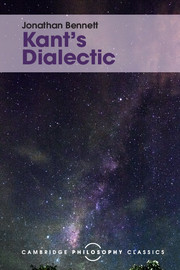Book contents
- Frontmatter
- Contents
- Preface to this edition by Karl Ameriks
- Preface
- System of references
- 1 Introduction
- 2 Concepts and intuitions
- 3 Substances and reality
- 4 The substantiality of the soul
- 5 The simplicity of the soul
- 6 The identity of the soul
- 7 Infinity
- 8 Limits
- 9 Divisibility
- 10 Freedom
- 11 God
- 12 Reason
- Index
Preface to this edition by Karl Ameriks
Published online by Cambridge University Press: 05 July 2016
- Frontmatter
- Contents
- Preface to this edition by Karl Ameriks
- Preface
- System of references
- 1 Introduction
- 2 Concepts and intuitions
- 3 Substances and reality
- 4 The substantiality of the soul
- 5 The simplicity of the soul
- 6 The identity of the soul
- 7 Infinity
- 8 Limits
- 9 Divisibility
- 10 Freedom
- 11 God
- 12 Reason
- Index
Summary
Jonathan Bennett's Kant's Dialectic is a landmark work in modern scholarship. Its appearance in 1974 was one of the first expressions of a confluence of three major trends that for fifty years now have played a major role in philosophy. The first trend is the general re-emergence of metaphysics as a source of positive attraction for the best and the brightest in the field. A second surprising trend has been the renaissance of studies in the history of philosophy. Whereas earlier, history and philosophy were often contrasted as two different fields, a historical turn has now taken the form of an avalanche of detailed studies of major modern figures (e.g., Bennett's Locke, Berkeley, Hume: Central Themes, 1971), as well as an incorporation of historical considerations directly in the content of significant systematic argumentation. A third trend is the rehabilitation of Kant's philosophy, and a reconsideration of all aspects of his system as relevant to contemporary thought. Along with P. F. Strawson and Wilfrid Sellars, Jonathan Bennett was a prime analytic instigator of this movement already in the 1960s, with his first book on Kant, Kant's Analytic (1966). This book made Bennett famous as a practitioner of an approach that favours reconstructing a concise and interesting form of argument that seems to be present in the text, and then not hesitating to mercilessly expose its apparent shortcomings, all for the purpose of leading to more satisfactory arguments on the important topics under discussion. Kant's Dialectic employs a somewhat similar approach but expresses a broader perspective, one enriched with considerably more historical detail and reference to relevant predecessors. After an extremely helpful review, in the first three chapters, of the general themes of the ‘Analytic’, that is, the first major section of Kant's Critique of Pure Reason, Kant's Dialectic launches into a path-breaking and detailed treatment of the key metaphysical terms of the second major section of the Critique: substantiality, simplicity, identity, infinity, limits, divisibility, freedom, God, and reason. The mere fact that this part of Kant's text – which had for so long been ignored because of its seemingly old-fashioned themes: rational psychology, cosmology, theology – received such careful attention by Bennett was already a revolution in its time.
- Type
- Chapter
- Information
- Kant's Dialectic , pp. ix - xPublisher: Cambridge University PressPrint publication year: 2016



